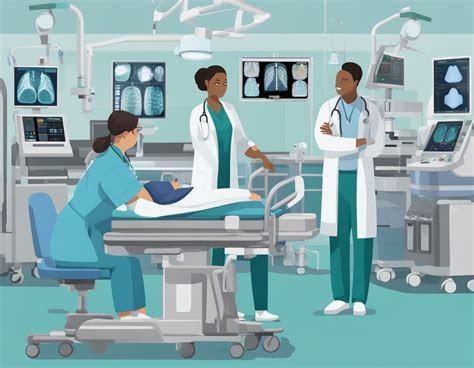Are you considering a career in the medical field, but unsure whether to become a radiology technologist or a nurse? Both professions are essential to the healthcare industry, but they require different skills, education, and job responsibilities. In this article, we will provide a comprehensive comparison guide to help you make an informed decision about which career path is best for you.
Importance of Radiology Technologists and Nurses
Radiology technologists and nurses play critical roles in the healthcare system. Radiology technologists are responsible for operating medical imaging equipment to help diagnose and treat diseases, while nurses provide hands-on care to patients, administer medications, and educate patients about their health conditions. Both professions require a strong understanding of human anatomy, physiology, and medical terminology.
Education and Training Requirements
The education and training requirements for radiology technologists and nurses differ significantly.
Radiology technologists typically earn an associate's degree or a postsecondary certificate in radiologic technology. These programs usually take two years to complete and include coursework in anatomy, patient assessment, and imaging procedures. Many radiology technologists also obtain certifications in specialized areas, such as mammography or computed tomography (CT) scanning.
Nurses, on the other hand, typically earn an associate's degree in nursing (ADN) or a bachelor's degree in nursing (BSN). ADN programs take two years to complete, while BSN programs take four years to complete. Nurses must also pass the National Council Licensure Examination (NCLEX-RN) to become licensed registered nurses (RNs).

Job Responsibilities and Work Environment
Radiology technologists and nurses have different job responsibilities and work environments.
Radiology technologists work in hospitals, clinics, and imaging centers, operating medical imaging equipment, such as X-ray machines, CT scanners, and MRI machines. They prepare patients for imaging procedures, position patients correctly, and ensure that images are of high quality. Radiology technologists may also assist physicians in interpreting images and providing diagnoses.
Nurses work in a variety of healthcare settings, including hospitals, clinics, nursing homes, and community health organizations. They provide hands-on care to patients, administer medications, and educate patients about their health conditions. Nurses may also conduct health assessments, develop care plans, and collaborate with other healthcare professionals to provide comprehensive care.

Salary and Job Outlook
The salary and job outlook for radiology technologists and nurses differ.
According to the Bureau of Labor Statistics (BLS), the median annual salary for radiology technologists was $62,760 in May 2020. The BLS also projects that employment of radiology technologists will grow 9% from 2020 to 2030, faster than the average for all occupations.
The median annual salary for nurses was $76,840 in May 2020, according to the BLS. The BLS also projects that employment of nurses will grow 12% from 2020 to 2030, much faster than the average for all occupations.

Skills and Qualities Required
Radiology technologists and nurses require different skills and qualities.
Radiology technologists need to have:
- Strong technical skills to operate medical imaging equipment
- Good communication skills to interact with patients and healthcare professionals
- Ability to work independently and as part of a team
- Strong attention to detail to ensure high-quality images
Nurses need to have:
- Strong critical thinking skills to make sound judgments about patient care
- Good communication skills to interact with patients, families, and healthcare professionals
- Ability to work in fast-paced environments and prioritize tasks effectively
- Strong empathy and compassion to provide emotional support to patients

Certifications and Specializations
Both radiology technologists and nurses can obtain certifications and specializations to advance their careers.
Radiology technologists can obtain certifications in specialized areas, such as:
- Mammography
- CT scanning
- MRI
- Nuclear medicine
Nurses can obtain certifications in specialized areas, such as:
- Critical care
- Pediatric care
- Gerontological care
- Oncology care

Gallery of Radiology Technologist and Nurse Career Paths





Frequently Asked Questions
What is the difference between a radiology technologist and a nurse?
+A radiology technologist operates medical imaging equipment to help diagnose and treat diseases, while a nurse provides hands-on care to patients, administers medications, and educates patients about their health conditions.
What are the education and training requirements for radiology technologists and nurses?
+Radiology technologists typically earn an associate's degree or a postsecondary certificate in radiologic technology, while nurses typically earn an associate's degree in nursing (ADN) or a bachelor's degree in nursing (BSN).
What are the job responsibilities and work environments for radiology technologists and nurses?
+Radiology technologists work in hospitals, clinics, and imaging centers, operating medical imaging equipment, while nurses work in a variety of healthcare settings, providing hands-on care to patients, administering medications, and educating patients about their health conditions.
Conclusion
Radiology technologists and nurses are essential to the healthcare industry, requiring different skills, education, and job responsibilities. By understanding the differences between these two careers, you can make an informed decision about which career path is best for you. Whether you choose to become a radiology technologist or a nurse, you will have the opportunity to make a positive impact on patients' lives and contribute to the advancement of healthcare.
